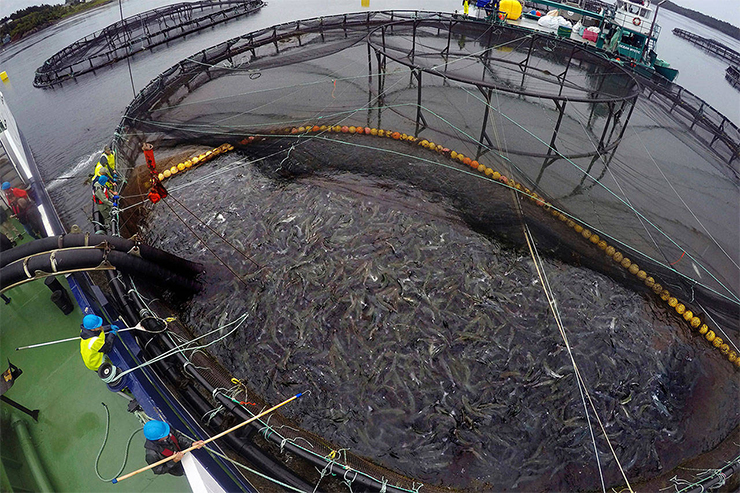Frankenfoods is a term developed by consumer groups questioning the health and safety of genetically modified plants or GMO. The US Food and Drug Administration has just lifted an earlier ban on commercialization of the first genetically modified food, Salmon. This is the first time ever permission to sell GMO animals for human consumption in the US has been allowed. It should raise alarm bells not only in the USA.
On March 8, the FDA, responsible for food safety, lifted an earlier ban on sale of GMO salmon by the Massachusetts biotech company, AquaBounty. Until now the company had been prevented from importing its GMO eggs to its salmon tanks in Indiana.
The reason given by the FDA for now removing the ban is not reassuring. They state that a new regulation labeling disclosure that a food is “bioengineered” gives consumers enough information to make an informed choice. For most people, even if the small print is readable, bioengineered may not be understood as a euphemism for controversial genetic manipulation.
The company, which was prevented in 2015 to sell its genetically altered salmon pending resolution of labeling court cases, has patented a method to modify Atlantic salmon with DNA from other fish species to create a sterile Atlantic salmon female that grows up to twice as fast. The process genetically modifies farmed Atlantic salmon with a growth-hormone gene from the Chinook salmon and a piece of DNA from the ocean pout. The corporate driver seems to be cutting costs, not health or safety. The company plans to send its GMO salmon eggs from its facility in Canada to its Indiana growing tanks where it would take around 18 months to reach 10 pounds.
AquaBounty Technologies is majority-owned by Intrexon Corporation of Maryland, which also owns a company developing controversial gene-drive technology.
Big Outcry
The FDA approval of GMO salmon from AquaBounty is being met with major protest from various interest groups. George Kimbrell, Legal Director at the Center for Food Safety, points out that the new labeling guidelines do not require the salmon to be clearly labeled “genetically modified.” As Kimbrell notes, “These guidelines… instead allow producers to use QR codes or 1-800 numbers for more information.” Good luck, consumers.
The AquaBounty GMO salmon project has a history and it’s not all reassuring. In a bizarre decision, some years ago the FDA announced that the agency would rule on genetically modified animals such as GMO salmon under the category of “new animal drugs.”?… That goes back to at least 2013 and the Obama era when the leading figures at FDA were a de facto revolving door to the GMO industry corporations. By so doing, it avoids having to seriously consider environmental risks such as escape of GMO salmon to interact with natural salmon or other fish species.
Currently the company states it will grow the eggs to full size at their inland facility in Indiana. However the company also announces it plans to expand. Four years ago the same company had a facility in Panama that had documented security defects that could allow the GMO salmon to escape into the Ocean and potentially contaminate natural salmon or other fish in unknown ways. Once they begin production in Indiana and sales start to boom, will they be tempted to add more risky facilities such as in Panama?
The FDA, in approving the AquaBounty GMO salmon, argued that the GMO farmed salmon is just as nutritious as eating non-GMO farmed salmon. The problem is that that is not a healthy benchmark, as modern salmon farms, typically with half a million fish at a time, use significant chemicals and antibiotics in production. Studies have found that for example a type of cancer-causing pesticide, polychlorinated biphenyls, exists in farm-raised salmon at 16 times the rate of wild salmon.
Another issue with the GMO farmed salmon is that aquaBounty acknowledges they will be fed soymeal, which in the USA almost guarantees it is GMO soymeal. And according to Jaydee Hanson, the Senior Policy Analyst at the Center for Food Safety, the GMO salmon have fewer desirable Omega-3s. Key he says, is the ratio of desirable Omega-3 to undesirable inflammatory Omega-6 fatty acids. He states, “The ratio of 3s to 6s in this AquaBounty fish is the worst of any farm fish, and this is in AquaBounty’s own data.”
Astonishingly, despite a failed allergy-reaction test by AquaBounty the FDA did not apparently require them to make a serious retest. As well the GMO salmon requires abnormally high levels of growth hormones. Such hormones in beef have been shown to create a hormone called IGF that leads to higher levels of cancer. This apparently was not considered by FDA officials to be a serious problem.
Now, simply to be able to grow such farmed fish twice as fast we are told to ignore basic considerations of health and safety. Further, what is not known is whether AquaBounty uses gene-driver gene editing technologies in its GMO salmon.
AquaBounty also stated it wasn’t going to test for human reactions, as the FDA didn’t require it. Isn’t the health of the population paramount especially when it involves something as radical as the first genetically modified animal approved for human consumption?
F. William Engdahl is strategic risk consultant and lecturer, he holds a degree in politics from Princeton University and is a best-selling author on oil and geopolitics, exclusively for the online magazine “New Eastern Outlook.”
